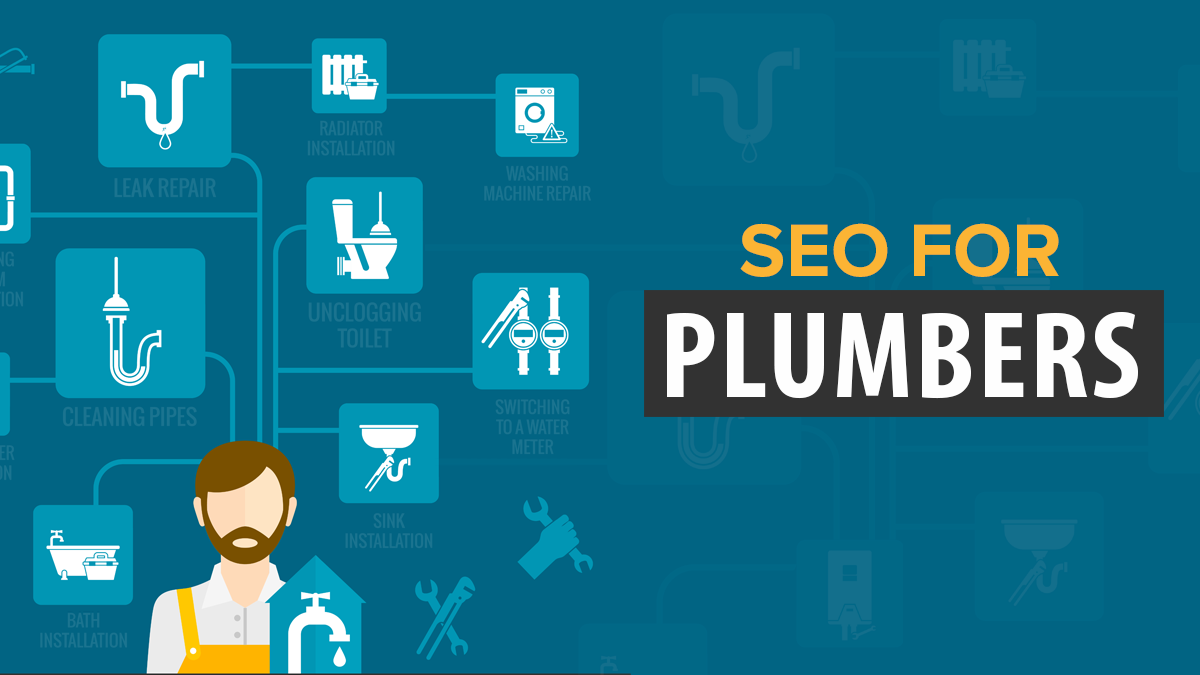When it comes to getting your business in front of customers who are in need of service, the plumbing industry is extremely competitive. Nowadays, it is a common practice for people who require a plumber right away to start by calling the top Google listing and work their way down from there. All in all, how would you ensure that your business possesses the top posting when nearby clients are searching for a plumber to get out to their home or business as fast as could be expected?
Plumbing is one of the most essential services and so even more plumbing companies will appear in your area on search engines. While this allows potential customers to exercise their choice, it forces your business to compete for foot traffic and online traffic, which can have a significant impact on lead generation. This SEO for plumbers guide will teach you everything you need to know to stay competitive and dominate local search engine results.
What is SEO for Plumbers?
SEO for plumbers is an important part of digital marketing for plumbing businesses. It includes enhancing the organization’s site and Google Business Profile postings to further develop its search engine results and online perceivability. The goal is to make the company more visible and get more targeted traffic, which will result in more sales and leads. Optimizing Google Business Profile listings and improving website content, structure, and technical elements are two aspects of plumber SEO. Plumber SEO is a necessary component for plumbing businesses to succeed in the digital age because most consumers look for local services online.
Why is SEO Important for Plumbers?
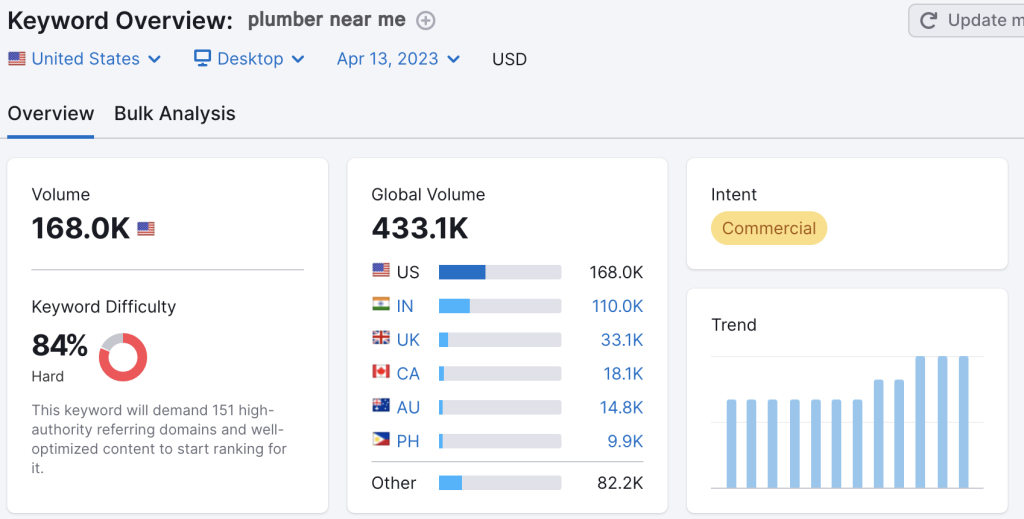
The sheer volume of people searching for it is one of the main reasons why SEO is so crucial for plumbers. Let’s look at an example: how many people are looking for plumbers in their area? Running the keyword through any of the SEO tools will reveal a huge volume of people looking for nearby plumbers. As a result, SEO is an essential consideration for plumbing businesses. First of all, most consumers nowadays look for local services online, so plumbing companies need to have a strong online presence. Second, local SEO increases a plumbing company’s visibility and credibility by enhancing its search engine results.
More targeted traffic as a result of this rise in visibility leads to more sales and leads. In addition, SEO leads have a higher close rate than traditional outbound leads. Recent research shows that SEO leads have a much higher close rate than outbound leads. This demonstrates how effectively SEO generates leads for plumbing companies. Additionally, plumbing businesses should consider SEO as a long-term investment. SEO results, in contrast to paid advertising, are long-lasting and continue to generate traffic, leads, and sales over time, even after the advertising budget is exhausted.
lso Read: Local SEO vs National SEO: Which one to Choose?
How to Perform SEO for Plumbers?
The following steps can be taken to build a campaign that can maximize your business’s visibility for local searches and put your services in front of people when they are ready to hire a plumber.
Optimize Google My Business (GMB) Profile
Google My Business (GMB) optimization is an essential component of any SEO strategy for a plumbing company. It can make it easier for people looking for plumbers in your area to find you and increase traffic to your website, resulting in more leads and customers for your business. For instance, suppose you’re a plumber situated in Los Angeles and you need to draw in additional clients in your space. By upgrading your GMB posting, you can ensure you’re one of the top outcomes when individuals look for “plumbers in Los Angeles.”
This may result in more visitors to your website, where they can learn more about your services and schedule an appointment. All in all, why not give your GMB posting a little tender loving care and see the advantages for yourself? Your GMB listing can be optimized for plumber SEO in the following ways:
- Claim Your Listing and Verify It
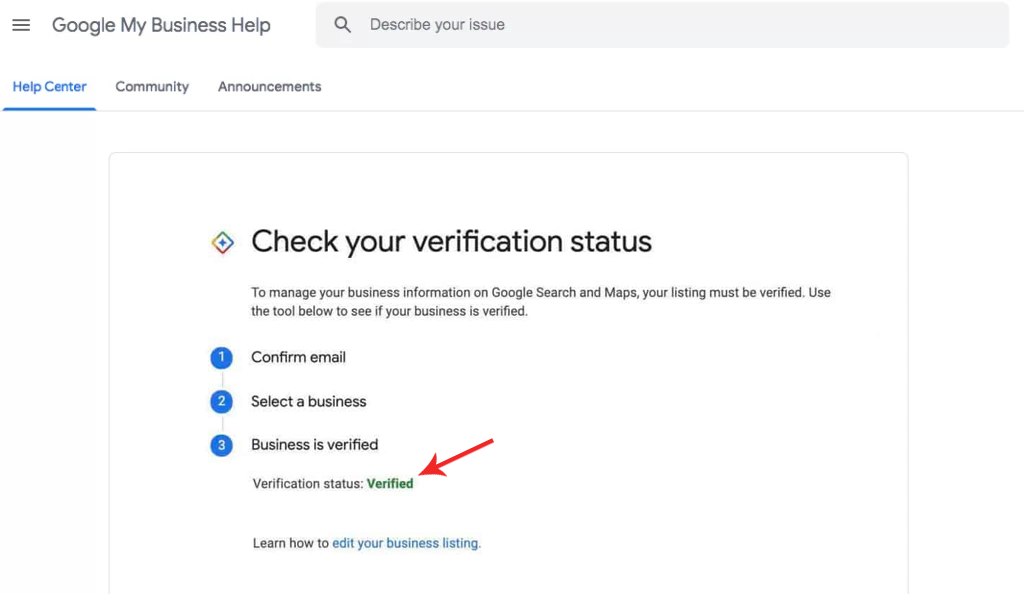
You must claim and verify your GMB listing before you can optimize it. If you don’t already have one, you’ll need to create one and provide information about your business, like your name, address, and phone number.
- Complete Your Profile
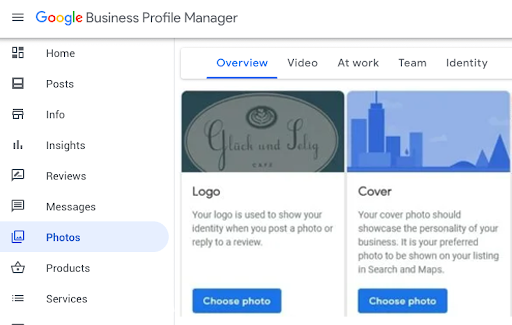
When your posting is asserted and confirmed, try to finish your profile by giving precise and exceptional data about your business. This includes pictures of your work, information about your services, and your business hours.
- Keywords to Use
Include keywords that best describe your company in your business description and in your GMB profile’s “Services” section. You will rise in relevant search results as a result of this.
You can add keywords in the following places,
- Add keywords in business description
- Include keywords in your products and services
- Use relevant keywords when posting
- Add keywords in the business attributes section
- Ask Customers for Reviews
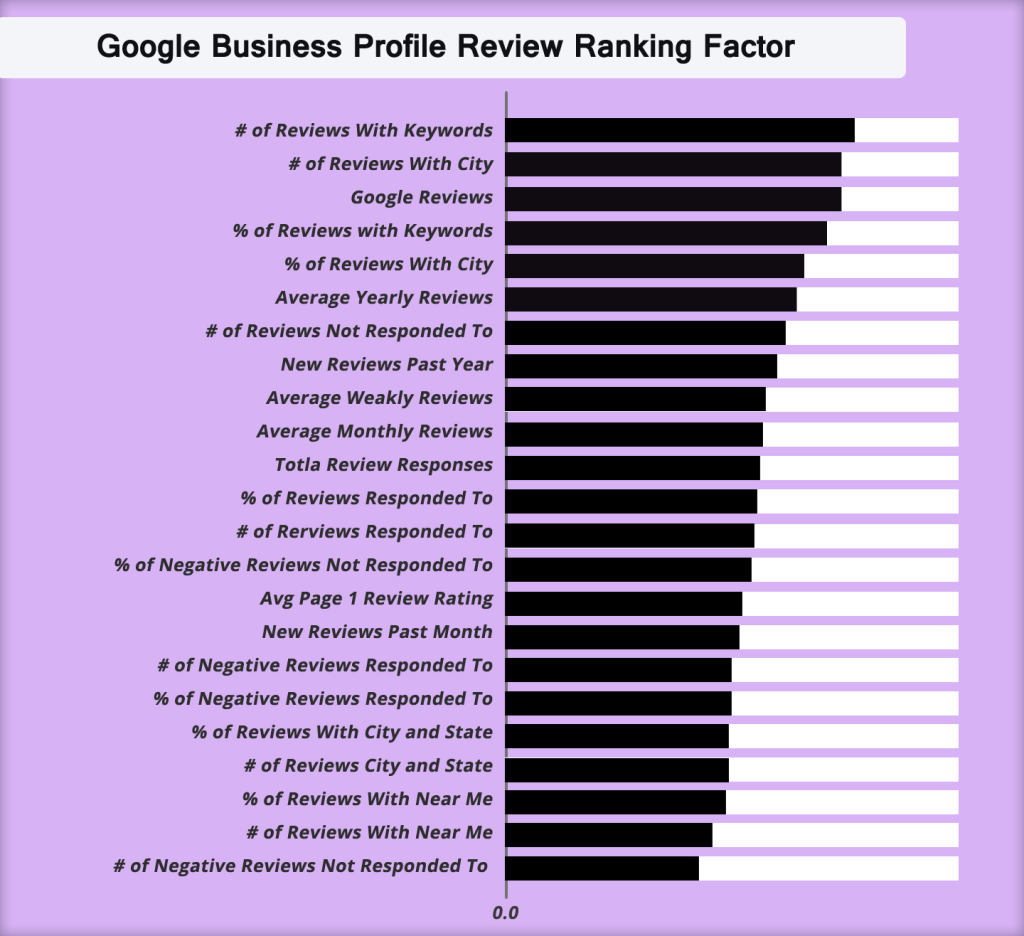
Your ranking in local search results can be significantly improved by getting good reviews from customers. Follow Google’s guidelines for reviews to encourage satisfied customers to leave reviews on your GMB listing. You would be ranked higher if you had more favorable feedback.
- Make Sure Your Information is Up-to-date
Keep your GMB listing up to date with any changes to your business’s information, like new hours or services. You can boost your plumbing company’s visibility in local search results, acquire more customers, and expand your business by adhering to these best practices for GMB optimization.
- Use Official Details
On your Google My Business page, as well as on your website and other online pages, check to see that the official versions of your business name, address, and phone number are being used. The online version of the Yellow Pages, a business page on Facebook, and directory listings are all examples of additional web pages. Three positive outcomes result from adhering to this practice are,
- Your business’s location in the Maps section will be accurate
- Consistent web listings will fully optimize your NAP
- Customers will have an easier time finding your business
Check to see that your Google My Business page’s hours of operation match those on your website, Facebook page, and other online directories. Include separate information if you provide emergency services outside of regular business hours.
- Add Business Description
You can use the description section to show potential customers why your plumbing company is the best option for their issue. The benefits of hiring you, your qualifications, your services, and a call to action should all be included in this description. Include all of the keywords related to your plumbing services and specialties in your business description to fully optimize it. Your description should be between 100 and 200 words.
An example of a formula for your Google My Business description is as follows: Name of the Business} offers proficient {list plumbing services} in {Your City}. { Give some background information about your company and the reasons why clients hire you. Now, Dial {Phone Number}, we’ll be there in under an hour.
- Use Logos and Images
Make the most of this option because images will draw attention to your Google My Business page and boost engagement. Google allows you to display multiple images and your company’s logo on your page. On-the-job shots, shots of your company’s exterior or interior, and shots of you and your employees are all possibilities for these images. Use images with a minimum resolution of 720px x 720px, a sharp focus, and a file size between 10KB and 5MB for the best results. A picture of your company or its logo can also be used in place of the default background image for Google My Business.
Do Keyword Research for “Plumbing-Related” Business
Keyword research is an essential part of search engine optimization (SEO) for businesses that are related to plumbing. You can increase the number of qualified leads coming to your business and increase your website’s visibility in search results by determining and focusing on the appropriate keywords. To conduct keyword research for plumbing-related business keywords, follow these steps:
- Determine who you want to reach: Think about the kind of customers you want to have and what they might be looking for in a plumber. You can design your business model as per your customers requirements.
- Use tools for keyword research: You can find popular keywords related to plumbing services using a variety of free and paid keyword research tools, such as Google Keyword Planner, SEMrush, and Ahrefs.
- Find long-tail keywords: Long-tail keywords are a great target for SEO because they are more specific and frequently have less competition. You could, for instance, target “emergency plumber in Los Angeles” as opposed to just “plumber.”
- Take a look at your rivals: Examine the keywords that are being used on the websites of your rivals. You can see which keywords your rivals are ranking for by utilizing tools like SEMrush and Ahrefs.
- Include keywords on relevant pages: Make sure to include the relevant keywords on your website’s homepage, services page, and blog posts once you have determined your target keywords. Use them naturally and avoid keyword over-optimization in your content.
Plumbing related keywords
| Keyword | Volume | Difficulty |
| Bathroom Remodeling | 33100 | 88 |
| Drain Cleaning | 22200 | 82 |
| Plumber | 110000 | 78 |
| Faucet Repair | 2400 | 71 |
| Leak Detection | 12100 | 65 |
| Plumbing Repair | 14800 | 64 |
| Toilet Repair | 12100 | 63 |
| Water Heater Repair | 33100 | 62 |
| Emergency | 27100 | 50 |
| Pipe Repair | 1900 | 43 |
By carrying out in-depth keyword research and focusing on the appropriate keywords, you can enhance the visibility of your website in search results and bring in more customers to your plumbing business.
Create Variety of Quality Content
With regards to SEO for plumbers, perhaps the main thing you can accomplish is to work on your site’s content. A great way to boost traffic and improve your website’s search engine rankings is to produce high-quality content that answers questions and adds value to your customers. So, on a plumbing website, what kind of content is appropriate? A few examples include:
- Blog Posts

A great way to provide value to your clients and boost your search engine rankings is to write blog posts on plumbing-related subjects like how to fix a leaky faucet or how to prepare your pipes for winter. Make sure that your blog posts are well-written, well-researched, and full of useful information.
- How-to Videos
Creating videos that show how to do common plumbing tasks like unclogging a drain or replacing a toilet can be a great way to improve your website’s search engine rankings and provide value to customers. Make sure your videos are of high quality, easy to understand, and full of useful information.
- Testimonials and Customers Reviews
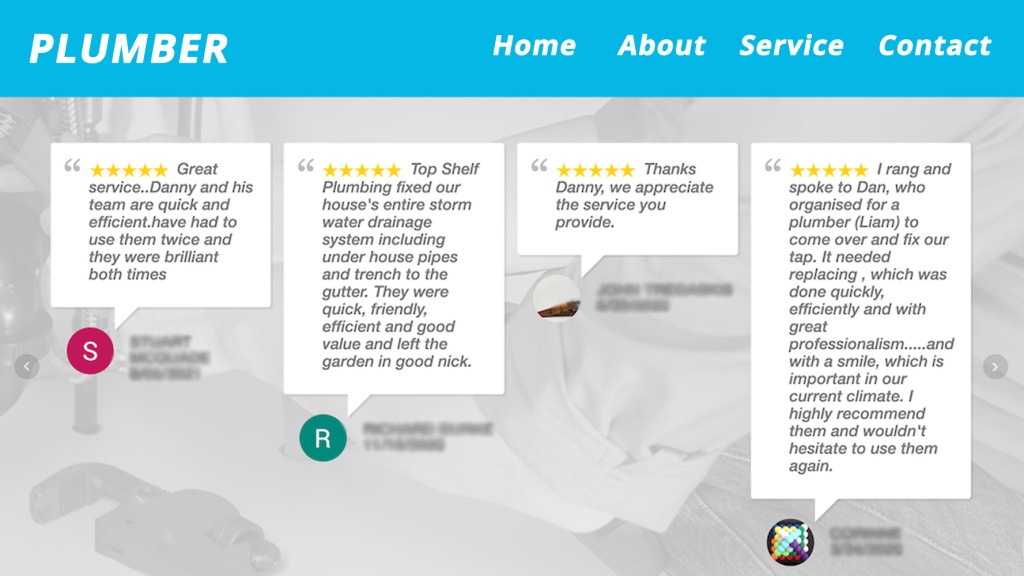
Your website’s search engine rankings can rise significantly if you include testimonials and reviews from satisfied customers. Urge your clients to leave surveys on your site or on well known review sites like Yelp or Google My Business. You can also provide customer testimonials in a separate section of your website.
Now that you know what kind of content a plumbing website can use, how can you make that kind of content? Here are some pointers:
- Find out what your customers want to know: Invest some time exploring the inquiries your clients are posing to about plumbing, both on the web and face to face. You’ll get a good idea of what kind of content you should create from this.
- Research keywords with tools: Find out which plumbing-related keywords your customers are searching for using tools like Google Keyword Planner or Ahrefs. Using this, you can make your content more search engine friendly.
- Be creative: Be as imaginative as you want with your content. Find novel and interesting ways to add value to your customers by thinking outside the box.
You can increase traffic to your plumbing business and improve your search engine rankings by implementing these suggestions and working on the content of your website.
Perform On-Page SEO
An important part of SEO for plumbers is on-page SEO. It involves optimizing your website’s elements to boost your business’s traffic and improve your search engine rankings. You can ensure that your website is easily found by search engines and offers your customers an excellent user experience by concentrating on on-page SEO. So, what’s the significance of on-page SEO for plumbers? Several reasons exist, a few of them are,
- It boosts your rankings in search engines: You can increase website traffic and improve your search engine rankings by optimizing on-page elements like headers, title tags, and meta descriptions.
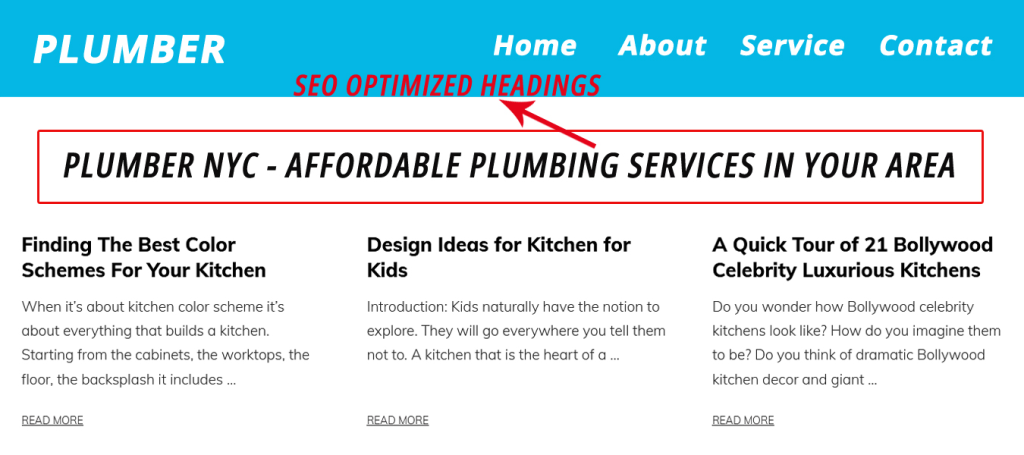
- It makes the user experience better: You can improve your customers’ user experience by optimizing your website’s structure and content. Your company may experience increased engagement and sales as a result.
- It helps you differentiate yourself from your rivals: You can differentiate your business from the competition and increase the number of customers who use your plumbing services by implementing on-page SEO best practices.
So, when it comes to plumbers’ on-page SEO, what aspects should you concentrate on? A few key areas are as follows:
- Meta Description and Title Tags
Each page’s content should be accurately described in your title tags and meta descriptions, which should also include relevant keywords. This will assist search engines in comprehending your website’s content and raise your search engine rankings. The meta description aids the user without requiring them to click on the page by providing contact information and other useful information.
- Headers
The H1 and H2 tags on your website should be used to organize your content and include relevant keywords. Your search engine rankings will rise as a result of search engines learning how your content is organized.
- Content Optimization
The content of your website should be optimized for both customers and search engines. This entails including keywords that are relevant, providing information that is useful, and formatting your content in a manner that makes it simple to read and navigate.
- Structure of URL
Both customers and search engines should be able to easily read your website’s URLs. This means using relevant keywords and avoiding URLs that are too long or complicated.
- Multimedia Content
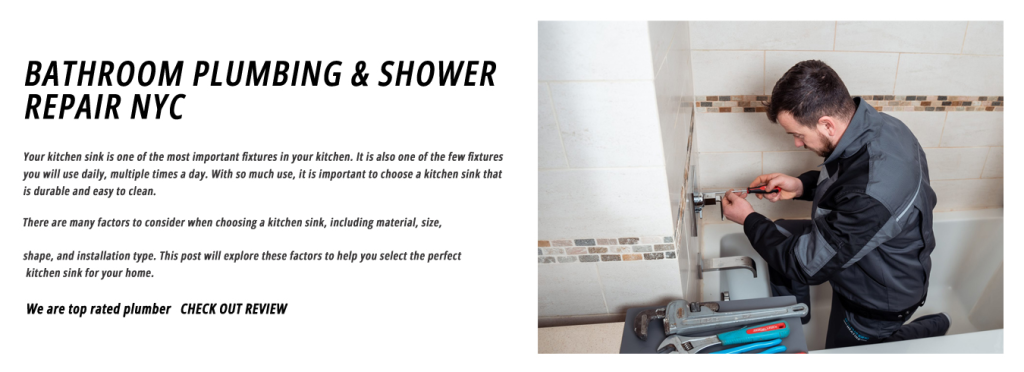
Your website’s visual appeal and user engagement can both be enhanced by including multimedia and high-quality images. However, it is essential to include relevant alt tags and descriptions in order to optimize these elements for search engines.
- Internal Linking
Search engines can learn more about your website’s structure and content hierarchy by using internal linking. Include relevant anchor text in all of your website’s internal links to relevant pages.
- Site Speed
User experience and search engine rankings both depend on site speed. Reduce server response times, compress images, and ensure that your website is optimized for quick load times.
- Mobile Device Optimization

It is essential to make certain that your website is mobile-friendly because an increasing number of customers are searching for local services using mobile devices. This means optimizing your content for mobile devices and employing responsive design. To determine whether or not your website is mobile-friendly, simply go to Google and conduct a search for “mobile optimized website.” In the results, paste your website URL into the given column to obtain a free report on your website.
- Testimonials and Reviews
Your website’s user engagement and trust can be increased by including customer reviews and testimonials. To boost your search engine rankings, make sure to include relevant keywords and location data in these reviews.
- Contact Details
Make sure your business’s name, address, and phone number are included on your website and are accurate and current. Your local search rankings may rise as a result of this by helping search engines comprehend your location.
You can improve your website’s search engine rankings, bring in more customers to your business, and give your customers a better user experience by optimizing these on-page SEO elements.
Perform Off-Page SEO
As a plumber, you are aware that having a robust online presence is necessary for expanding your business and acquiring new clients. On-page SEO strategies like optimizing your website’s content and meta tags are important. However, Off-page SEO strategies can also have a significant impact on your online visibility. Off-page SEO is the process of enhancing your online authority and reputation outside of your website. Increasing your website’s traffic and improving its ranking in search engine results pages (SERPs) are possible outcomes of employing these tactics.
- Backlinks
Building high quality backlinks is one of the most effective off-page SEO strategies for plumbers. Backlinks are links that point to your website from other websites. These links are seen by search engines like Google as a sign of your website’s credibility and authority. However, you must also ensure that the backlinks you generate are of high quality at the same time. Think about partnering with other local businesses in your area, like hardware stores or home improvement centers, to build backlinks. You can also write guest posts for blogs and online publications related to the plumbing industry. Additionally, check to see that your company is listed in relevant online directories like Google My Business, Angie’s List, and Yelp.
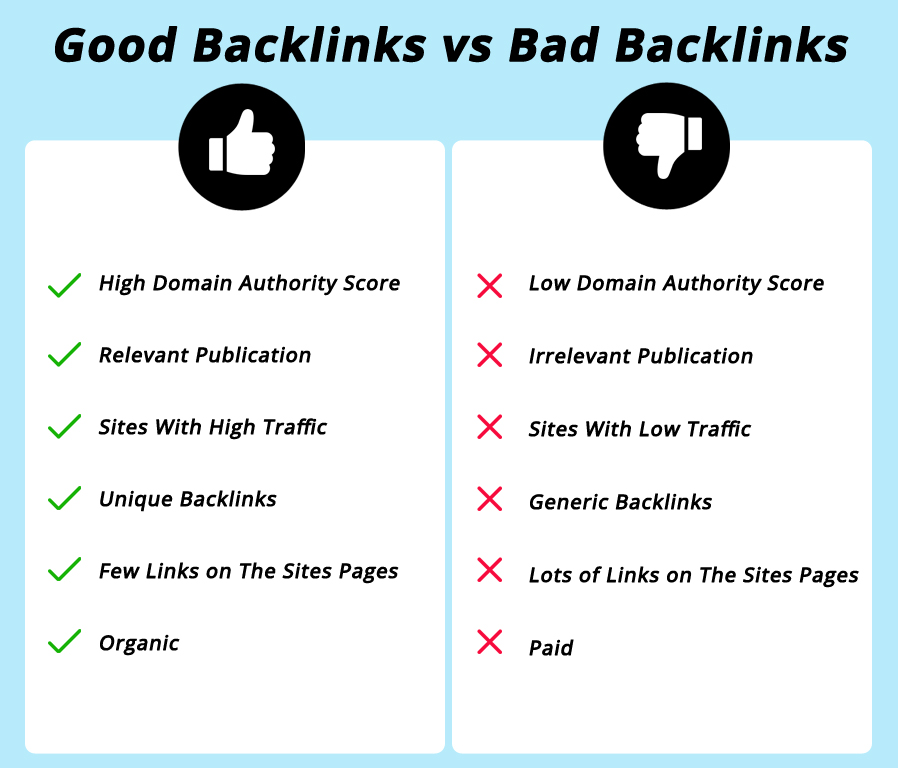
- Social Media Marketing
One more key off-page SEO optimization method is social media marketing. You can interact with your clients and demonstrate your expertise by creating and maintaining active social media profiles on platforms like Facebook, Twitter, and Instagram. This can also assist in increasing your search engine rankings and driving traffic back to your website.
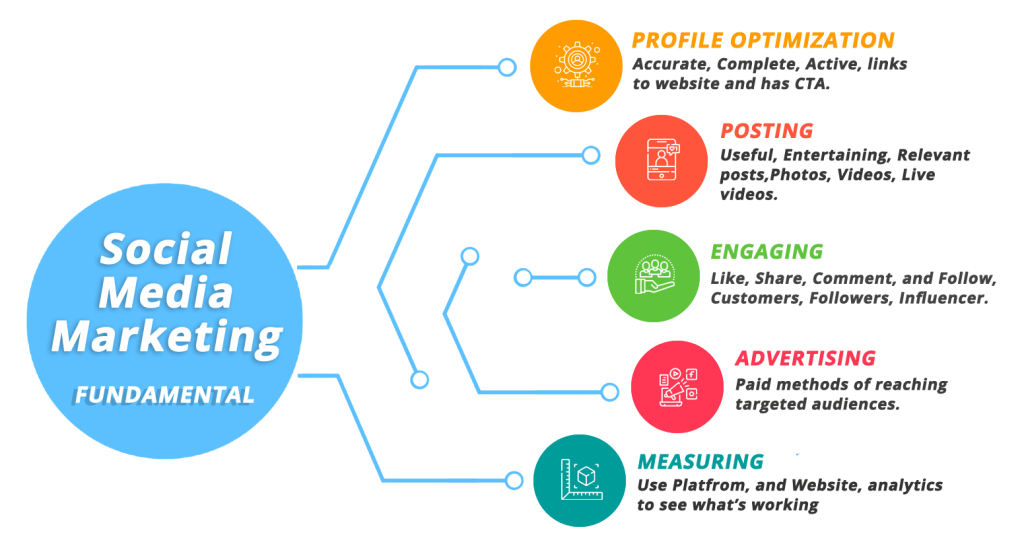
- Review Sites
Online reviews are also an important part of off-page SEO. Encourage your satisfied clients to post reviews about your business on well-known review platforms like Yelp and Google My Business. Your online reputation can be enhanced by positive reviews, increasing the likelihood that potential customers will choose your business.
Implement Technical SEO
As a plumber, you must ensure that your website is optimized for search engines as well as users. The process of optimizing your website’s technical aspects for better performance and visibility in search engine results pages (SERPs) is known as technical SEO. Here are some key specialized search engine optimization techniques that plumbers can use to work on their site’s presentation:
- Speed up your site: A website that loads slowly can hurt user experience and rank in search engines. Analyze your website’s speed with tools like Google PageSpeed Insights and implement necessary changes like compressing images, enabling browser caching, and reducing HTTP requests.
- Check for mobile responsiveness: Your website must be optimized for mobile users because the majority of web traffic comes from mobile devices. Check to see that your website is mobile-responsive, which means that it automatically adjusts to fit a variety of screen sizes and resolutions.
- Optimize the site structure: Efficient site structure makes it more straightforward for search engines to crawl your site. Your website’s content should be organized into categories and subcategories and its URLs should be clear and descriptive.
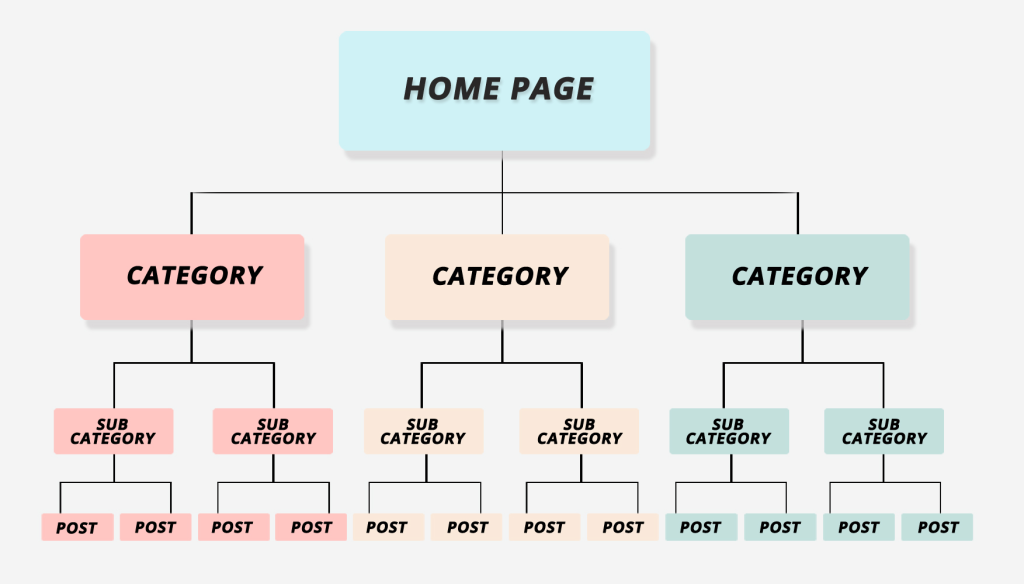
- Utilize structured data: Structured data can boost your website’s visibility in search results by providing search engines with additional context. To provide additional information about your plumbing services and location, you might want to think about adding structured data to your website, such as local business schema markup. For example, schema markup helps to display FAQs, in addition to the SERP results. Google is better able to comprehend and display the information thanks to the schema markup.
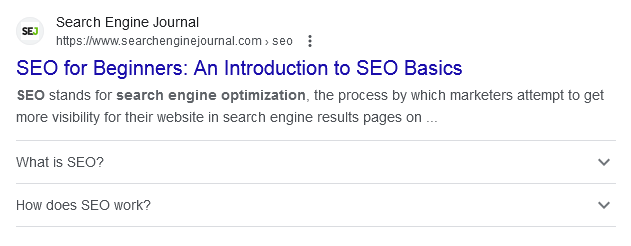
- Make use of SSL security: Data transmission between users of your website and your website is protected by SSL encryption. Adding SSL security to your website can boost user confidence and rank in search engines.
Plumbers can enhance their website’s performance and visibility in search engine results pages by implementing these technical SEO strategies. This can assist with drawing in additional clients to their business, thus helping business grow to the next level.
Implement Local SEO
If you’re a plumber, you probably rely on customers in your area to keep your business afloat. That is where local SEO comes in – it’s the act of upgrading your site and online presence to draw in additional neighborhood clients to your business. Plumbers can use the following key local SEO strategies to boost their online visibility in their area:
- Update your Google My Business listing: Businesses can manage their online presence on Google, including their business name, address, phone number, and reviews, with the free listing service Google My Business. Make certain that your listing contains accurate and complete information, including the most recent contact details and opening hours.
- Use local search terms: Use local-relevant keywords like “plumber in [city]” or “emergency plumbing services in [city]” in your online content and on your website. Your website may rise in the results of local searches as a result of this.
- Obtain local backlinks: Your website’s authority and visibility in local search results can both be improved by constructing backlinks from other local websites. To find out if local businesses, such as home improvement centers or hardware stores, would be willing to link to your website, get in touch with them.
- Get local reviews: Encourage your satisfied clients to write honest reviews for you on Yelp, Google My Business, and other relevant review sites. Your online reputation can be enhanced by positive reviews, which can also bring in more local customers.
- Get listed in local directories: Consider listing your plumbing business in local online directories, such as Angie’s List and Yelp. This strategy can enhance your visibility to local customers and improve your ranking in local search results.
Here’s a list of local directories for your plumbing website:
Plumbers can boost their online visibility and bring in more local customers by implementing these local SEO strategies. Their customer base increases and so the business expands.
Implement Content Marketing
Content marketing can help plumbers boost their search engine optimization (SEO) and acquire new clients. To successfully implement a content marketing strategy for your plumbing business, follow these steps:
- Determine your customer base: Knowing who your ideal customer is and what kind of content interests them is essential. For instance, if you are an expert in commercial plumbing, you might make content for building managers or owners of businesses. On the other hand, if your business primarily caters to residential customers, you might produce content geared toward homeowners.
- Start a blog: A blog is an excellent tool for publishing content on your website. You can write articles about plumbing tips and tricks, DIY projects, industry news, and other interesting topics for your target audience. If you specialize in environmentally friendly plumbing solutions, for instance, you might write a blog post about how to conserve bathroom water.
- Leverage social media: You can use social media platforms like Facebook, Twitter, and Instagram to promote your blog content and reach a larger audience. You are able to share links to your blog posts as well as other information that is helpful about your company. You could, for instance, post a picture and a brief description of a recent plumbing project you completed.
- Produce video content : Video content is a great way to show off your plumbing knowledge and skills, and it is becoming increasingly popular. You can share behind-the-scenes footage of a plumbing project you completed or instructional videos that teach viewers how to perform straightforward repairs. You could make a video that demonstrates how to fix a dripping faucet.
- Work with other businesses: You can reach a larger audience and establish yourself as an authority in your field by working with other businesses. You could collaborate with a local contractor to develop a joint marketing campaign or form a partnership with a home improvement store to produce a series of videos on how to do your own plumbing.
You can create a content marketing strategy that improves your SEO, brings in new customers, and establishes you as a respected plumbing industry expert by following these steps.
Monitor Your SEO Progress
Monitoring your SEO progress is an essential component of any digital marketing strategy, including plumbing marketing. You can track the progress of your SEO and make decisions based on data to boost your rankings and visibility by following these steps:
- Set up Google Analytics: You can monitor user behavior and traffic to your website with the free Google Analytics tool. You can keep track of how many people visit your website, which pages they visit, and how long they stay by setting up Google Analytics. You can also see how people are finding your website, whether through social media, organic search, or another method. Use Google Analytics to find,
- The number of people who visit your website, how long they stay, and how many pages they view
- How potential customers find your plumbing business through organic search, paid ads, social media, etc
Using Google Analytics, a company or SEO expert will also discover patterns in how potential customers interact with your website and areas for improvement.
- Use Google Search Console: Another free tool that can help you keep an eye on how well your website ranks in search results is Google Search Console. You can see which keywords your website ranks for, how many clicks and impressions it receives, and any errors or issues that may be affecting its performance by connecting it to Google Search Console. Using Google Search Console, you can do the following,
- Find out which keywords get the most views and clicks from potential customers
- Track your website’s rankings to see where it will appear on the search results page
- Find out which websites get the most visitors over a certain amount of time
Google Search Console will be utilized to enhance the technical SEO of your website if you work with a plumber SEO company or a freelance SEO specialist. This could involve adding your sitemap, keeping an eye on essential web statistics, or finding errors on your website that need to be fixed.
- Keep an eye on your keyword rankings: Utilizing keyword tracking tools like Semrush or Ahrefs, you can screen your site’s rankings for specific keywords. You can see how your SEO efforts are affecting your search engine visibility over time by tracking your keyword rankings. You could, for instance, keep track of your rankings for phrases like “emergency plumber” or “plumbing services near me.”
Also Read: 8 Best Local SEO Tools to Make Your Business Rank Higher in 2024
- Monitor backlinks: Because they tell search engines that your site is reliable and authoritative, backlinks are a crucial aspect of search engine optimization (SEO). You can keep track of the backlinks to your website and see which websites are linking to it by using a tool like Ahrefs. You can also keep an eye on the backlinks’ quality to spot any links that are spammy or of low quality that could be hurting your SEO efforts.
- Evaluate your rivals: Last but not least, it’s critical to keep an eye on your rivals’ SEO efforts and see where they rank for the same keywords you’re targeting. You can see which keywords your rivals are ranking for and which pages on their website are performing well by utilizing a tool like SEMrush. You can use this information to find new opportunities to improve your own SEO strategy.
Plumbers can improve their rankings and visibility by keeping track of their SEO progress and making decisions based on the acquired data.
Misconceptions About Plumber SEO
If you want to know more about plumber SEO and how it can help your plumbing business, you might stumble upon some falsehoods. It is essential to distinguish SEO myths from actual facts you should be aware of in order to maximize your SEO efforts.
- One of the greatest myths at any point told about search engine optimization is that it is a one-time thing. It is absolutely not the case. Between Google’s steady algorithm updates and other neighborhood plumbing organizations working hard to move forward their web search visibility, your search engine position will vary. It is up to your company to choose whether to employ a plumbing SEO specialist who can manage your SEO for you or to devote the necessary amount of time to doing so on your own. It might be helpful to have an idea of how much time you might devote to your website if you are willing to take on the project on your own.
- Another widespread misconception regarding SEO is that it is ineffective. Assuring that you are doing it correctly is the key to successful plumber SEO. The majority of businesses whose attempts at SEO have failed can blame poor implementation or maintenance. Because SEO for plumbers is constantly evolving, staying up to date on search trends and algorithm updates may be essential to your success. Hire a reputable marketing and SEO agency to help you get started if you are having trouble launching your own SEO efforts successfully.
- Last but not least, some people believe that SEO is a waste of money. We’ve all seen a modest bunch of sites show up high in search results that have been poorly optimized. Even though it’s possible, there’s not much of a chance if you don’t invest in SEO for your plumber. By executing search engine optimization, your business is improving its probability of being seen. Billboard ads cost advertisers billions of dollars, but they frequently do not know if they brought in any sales. On the other hand, SEO lets you use tools like Google Analytics and Google Search Console to track your website traffic and track your SEO efforts with tracking codes. You can assess how beneficial plumber SEO could be for your plumbing business on your own if you are able to observe the metrics and the plumbing leads that are coming in.
Wrapping Up
SEO investment is a long-term strategy, and the unfortunate reality is that results may not appear immediately. But the best way to increase your online visibility and get more plumbing leads is to use SEO in conjunction with other marketing strategies like plumbing ads. To get your plumbing company one step closer to the top of Google’s search results, use this guide as a starting point to improve your local SEO. This guide can also be used by those who are starting a new plumbing business and want to know how to use SEO to attract local customers and grow their business.
While the decision is eventually yours to either employ a plumbing SEO optimization company or begin overseeing it all alone, it is fundamental to know the advantages and burdens of every choice before you at last settle on your decision. First and foremost, you ought to be aware that your outcome may differ depending on your choice. Because of this, a busy business might decide that working with a plumbing SEO company is safer and more cost-effective than trying to do it on their own. You can save a lot of time and stress by hiring an SEO expert. Even better, you can rest assured that your plumbing website will be protected in the event of new algorithm updates.
FAQs
Is SEO worth it for plumbing business?
Since we live and work in a digital environment, search engine optimization is quite possibly the best option a plumbing business can use to grow further. A website’s potential to generate more leads and boost its return on investment (ROI) increases as it ranks higher in search results.
How long does it take for SEO to work for a plumbing business?
If you work with a reputable plumbing SEO partner, you can typically expect results within three to six months. Don’t give up if you don’t see any progress by then; it takes a lot of work and time to make it work and generate natural leads.
Should I hire an SEO company for my plumbing business?
The day-to-day monitoring of your plumbing company’s online presence is handled by an SEO company. You need a plumbing SEO company if your company doesn’t have the resources or time to sort through piles of analytical data, rankings, and traffic patterns.
